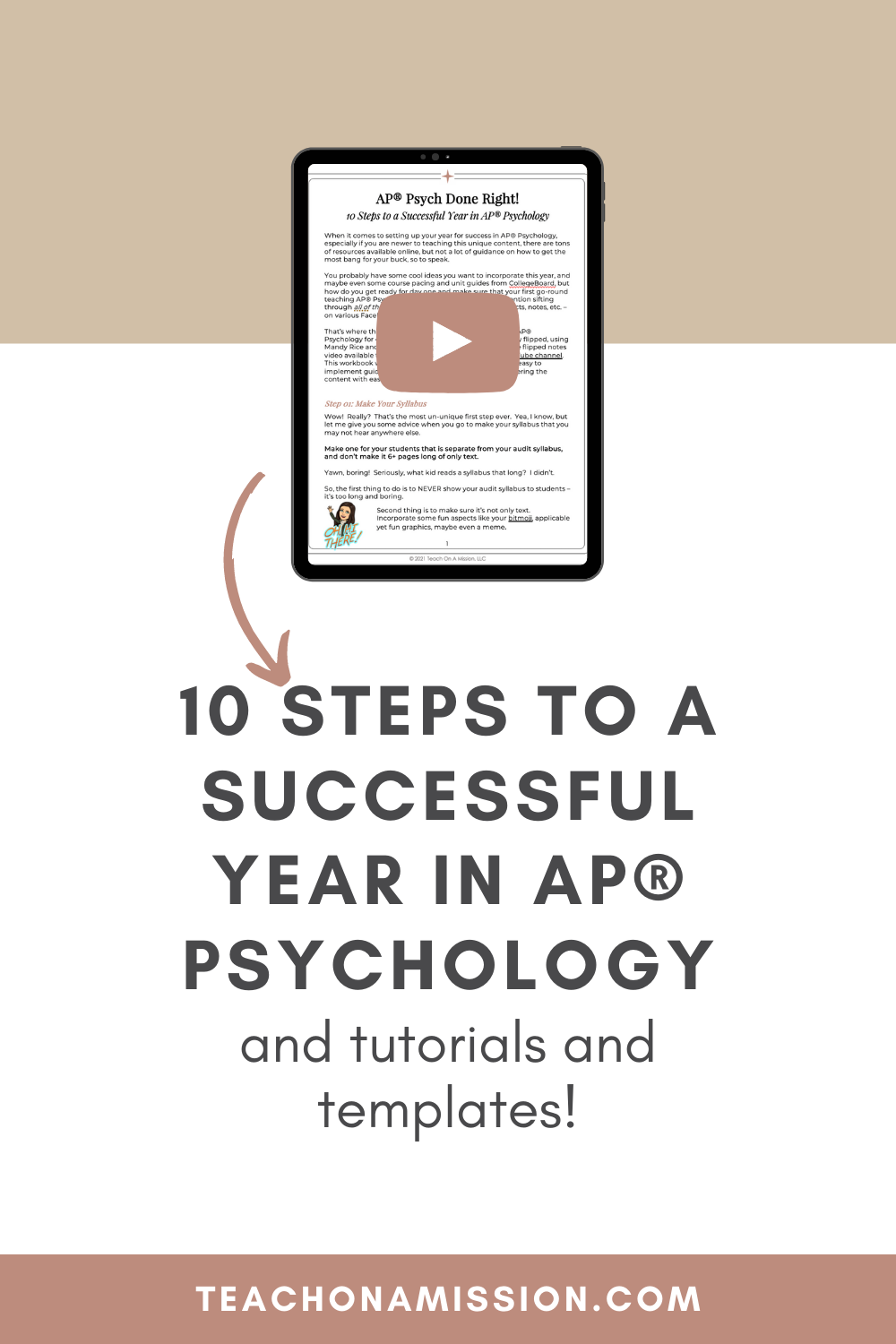It's Happening! What's It's Like to Be In One of our Sustainable Teacher Content Coaching Clubs

It’s happening right now. Really it is. We have three Sustainable Content Teacher Memberships open for enrollment right now, with amazing teacher- content coaches just waiting to support you, provide you with materials, and get you confident in your course.
Here’s the thing. As much as we, meaning myself and the amazing content coaches on my team love to teach and are absolutely reaching thousands of students, that’s not the only kind of impact we want to have.
We believe in empowering teachers. Building their confidence, and most importantly, removing huge chunks of their to-do list (without sacrificing effectiveness of course) so they can focus more on what this pandemic has taught us is truly important about what we do… making connections with our students. That’s it.
When your students are connected to you and within your classroom, they perform better. But most teachers, especially those new to their content area or course, don’t have the mental space or time on their ...
Do You Need A Content Coach?

AP® Psychology, Intro to Psychology, Sociology, Hybrid Psychology, American History, Honors American History, Women and Minority Studies… all courses that I taught in my ten years in the classroom. In each course I did have some materials from former teachers or current teams that were willing to collaborate, but I had to learn the content and standards of each of these courses… and this is nothing novel. I’m betting you’ve had a similar experience whether you’ve had multiple preps or had to teach a new course.
And as I shared in last week’s episode, a teacher who has to focus on learning the content they teach, although that is important, is less able to focus on their students’ growth.
I’d like you to have both. Know the content, well enough at least, and get to connect with kids and focus on their growth… all without having to sacrifice your evenings and weekends to do so.
My mission here at Teach On A Mission is to empower teachers to confidently step into that role as the ...
Are Teachers the Top Influence on Student Learning?

The conversation and debate around what is best for students, and what impacts learning most is not a new one in the human experience. It's been hotly debated for quite some time.
What impacts student learning most?
Are tests the best way to measure student learning?
Or, wait, don’t tests hinder learning?
How does technology impact learning?
Standards-based, flipped classroom, project-based, problem-based, student centered, backwards planning, flexible seating...
Wow - so many things. So many ways to impact student learning.
How in the world do we know what strategies impact students the most?
That's just it... there is no ONE strategy that will impact student learning more than another.
But...
... there is one person.
If you're reading this post, this is probably no surprise to you that teachers are the number one influencer on a student's learning.
But I don't want to just say that and claim it as truth. I want you to see for yourself.
And that’s exactly what I want...
3 Steps to a Successful Year in AP® Psychology

Guess what!?! Teach On A Mission, LLC, is growing, and I am so excited to introduce you to Rachelle Dusso in this episode. Rachelle is a five-year teacher in Wisconsin who is joining our team as the Content Coach for our Sustainable Psych Teacher membership for AP® Psychology teachers!
In this episode she not only introduces herself, but brings us 3 steps to a successful year for all our AP® Psychology teachers out there. But that’s not all… she’s got 7 more steps (plus a bonus)... that’s right 7 more actionable steps you can be taking this summer to make sure your school year is successful and sustainable in AP® Psychology.
Grab the full download - AP® Psych Done Right Teacher Workbook - at the link here.
To hear the full interview with Rachelle, please listen to the episode at the top of this page or on your favorite podcast streaming app - just search for Sustainable Teacher.
Rachelle is a fifth year teacher just outside of Milwaukee, Wisconsin, who teaches AP® Psycho...
AP Psychology Resources for Unit 9 Social Psychology
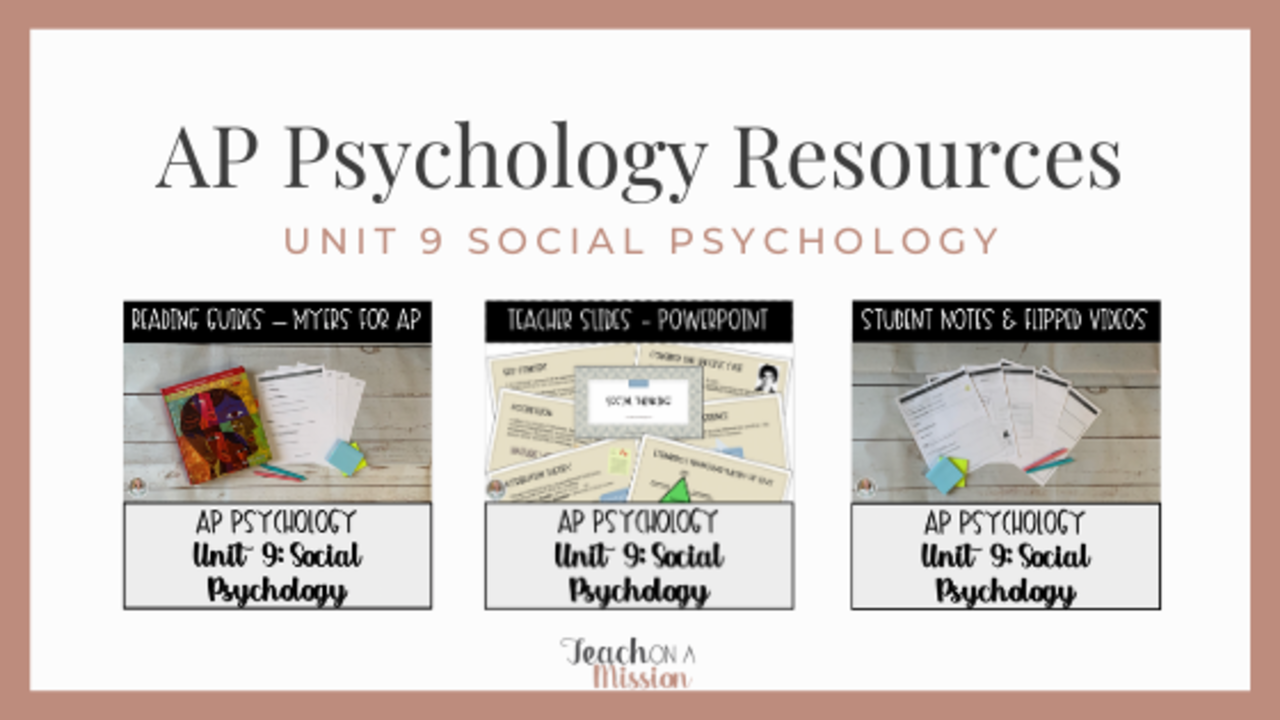
The LAST unit of the content (if you follow College Board's CED which is not mandatory)... can you even believe it?
I can't.
But I do love rounding out new content with this unit, social psychology. The reason being twofold.
- It may be the most applicable material of the entire course - students can easily make connections and recall examples from their own lives, but are also challenged to think of their behavior and judgements in ways they never have before. And,
- Instead of focusing on activities or guided practice, this unit is more dedicated to demonstrating the concepts, rather than memorizing or simply encoding them.
So you'll want to present the unit in exactly those two ways... the foundational concepts with notes and readings (as usual), and then application through demonstration, simulation, and reflection.
And, I'd like to provide you with some resources to help you do all of that for the social psychology unit.
Social Psychology Resources
First, be sure to hav...
AP® Psychology Resources for Unit 8 Clinical Psychology
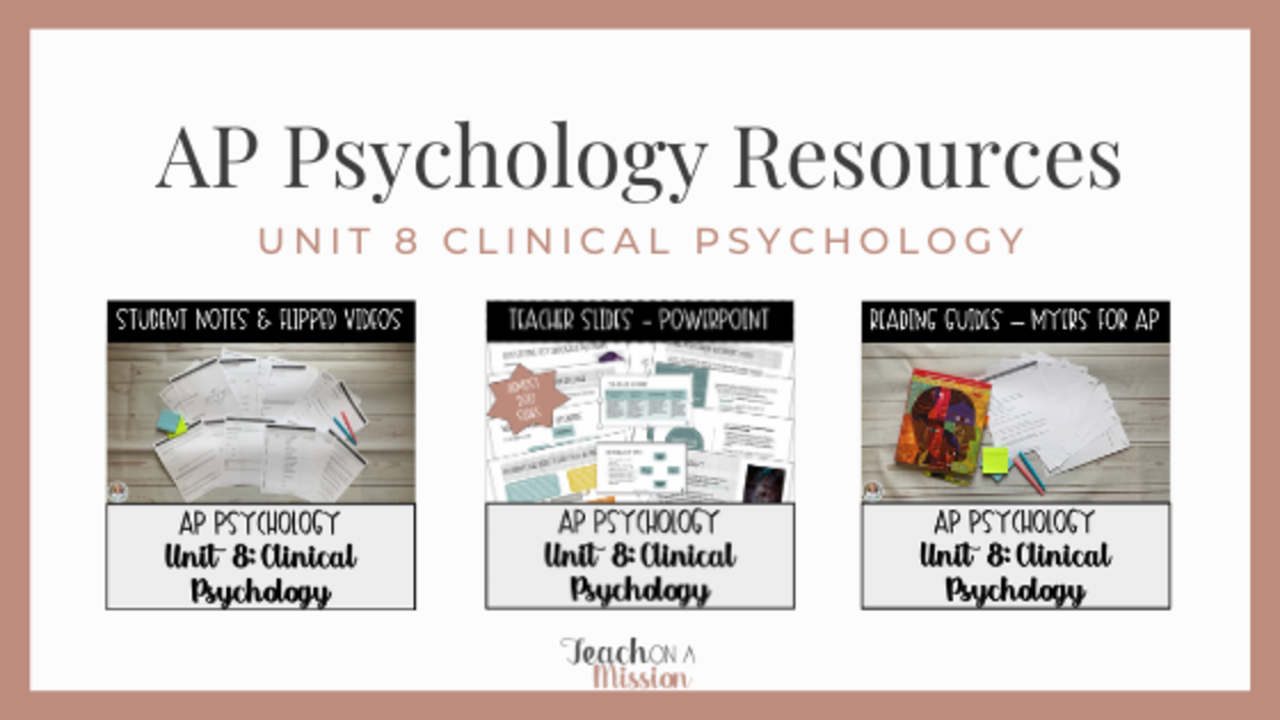
To say I LOVE this unit would be an understatement, and here's why...
- It is the perfect culmination (almost) of the course because it revisits the perspectives and that crucial knowledge students need to have, and
- Students love this unit; in fact it's probably a huge reason why many students take the entire course.
So I want to provide you with some resources to make this unit as awesome as it should be. Here we go.
Clinical Psychology Resources
All of the major disorder categories laid out by CollegeBoard are covered in these slides with understandable definitions and visuals to assist in your delivery of the content. This file also includes the Psychotherapies and Evaluating Psychotherapies slides.
To accompany these slides, I've created guided notes for students so they can spend their time focusing on the content and less focused on what to write and when. I've heard from many students and teachers that these guides really assist students in being able to put the...
AP® Psychology Resources for Unit 7 Motivation, Emotion, Stress & Personality
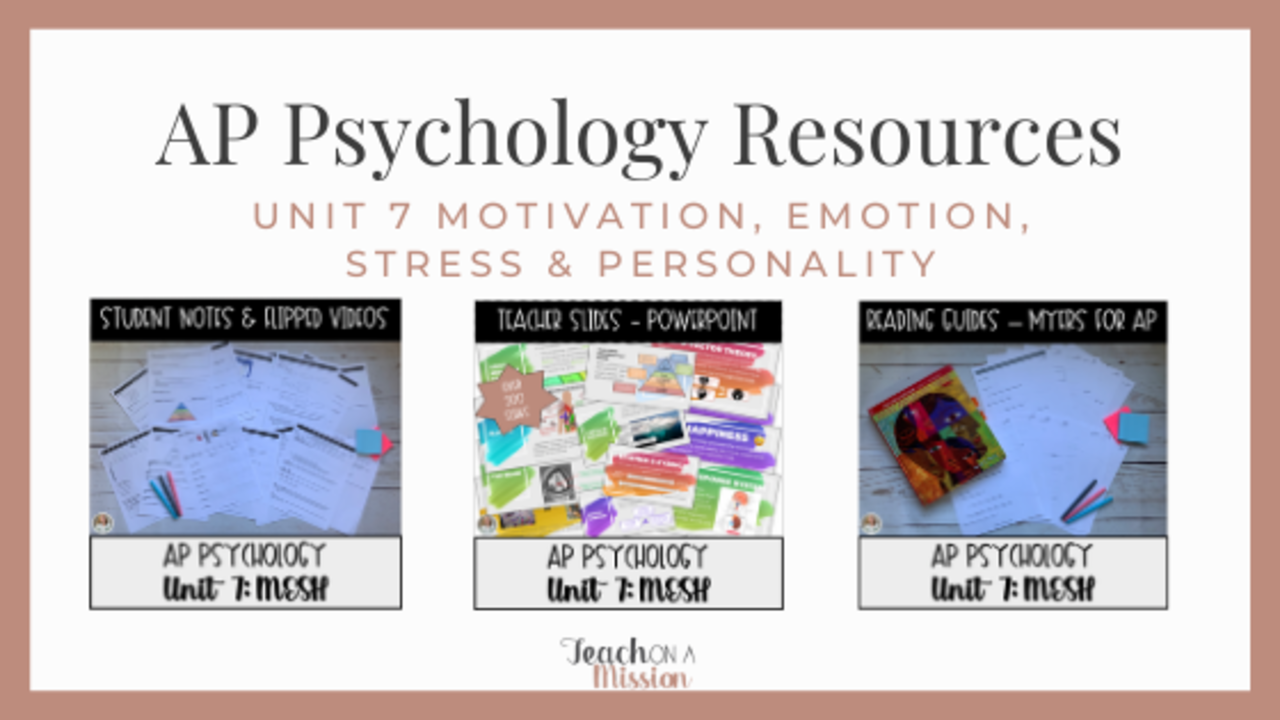
Phew. I've finished up the biggest haul of resources to date because of CollegeBoard's reorganization with the new CED in AP® Psychology.
Seriously - phew!
I can't wait to show it all to you, and to provide you with a fun free resource you can use to get your students up and moving just for sticking around here at Teach On A Mission.
So, what do we have here in Unit 7 - well it's a big one. Much like Cognitive Psychology, you'll want to be sure and keep this one nice and compartmentalized for students, helping them know where they are in their studies at all times.
I hope you find these resources helpful so you can spend time connecting with your students rather than on the wheel of content creation.
Slides
Let's start with the slides. There are 12 sets of powerpoint slides in 12 big topics covered throughout the unit. I like this unit in a flipped classroom, as I do all units, but I have to say the discussion that comes from these topics in class is pretty awesome. Be sure ...
AP Psychology Resources for Unit 6 Developmental Psychology

Holy moly, can you believe we are over half way through the content as we plan for and start unit six of nine. When you get back from your break at the half-way point you're probably working on starting Developmental Psychology, at least if you follow Collegeboard's new CED you are. If not though, that is NOT a huge deal. Really, these units would go well in just about any order.
Development is fun and short unit. Fun because it applies to all humans, including the ones sitting in seats in your classroom, making retention a bit more likely. But short because well, there's just not many standards or dedicated class time to it. But here's the thing... there are LOTS of stages and vocab terms that are unique and a bit foreign in this unit.
The great part is, if you've followed along with the pacing I've provided (and give in great detail in my AP Psych Teachers Membership), then you can see that you've got a decent bit of time to spend on Unit 6 - more so than the recommended clas...
AP Psychology Resources for Unit 5 Cognitive Psychology
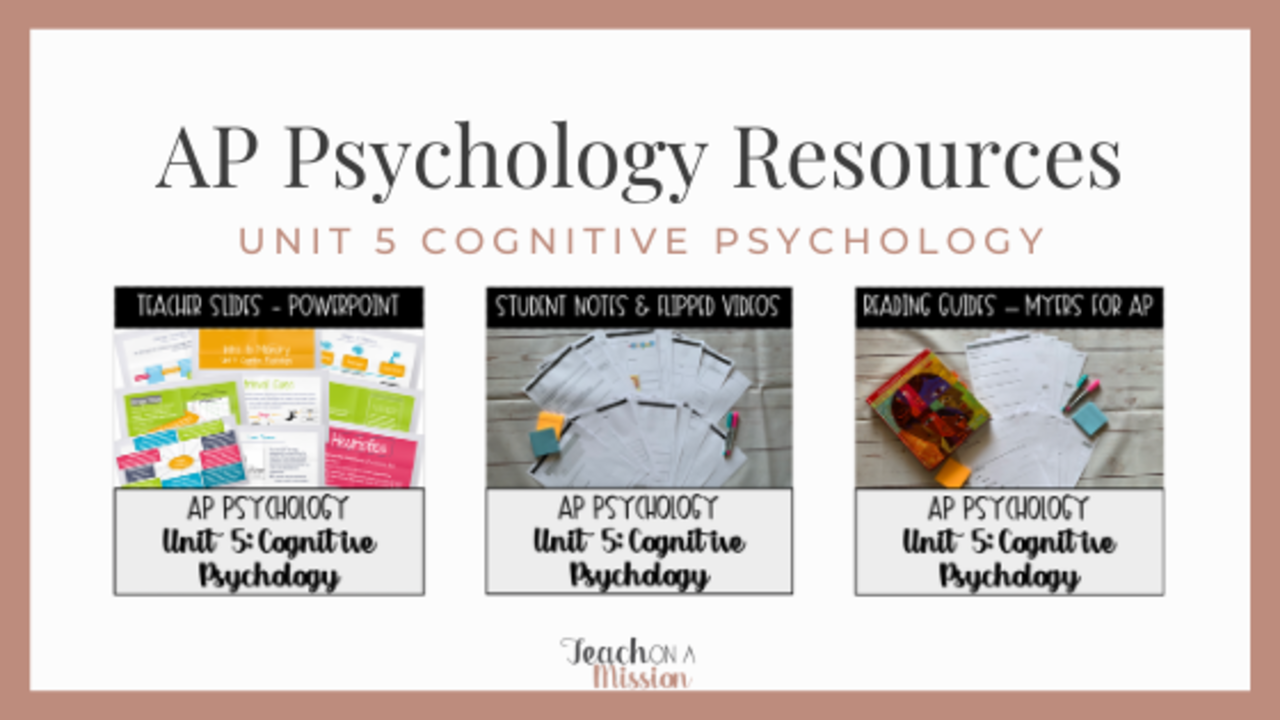
Phew! Cognitive Psychology is a beast! Seriously, CollegeBoard took what was already a huge unit that included encoding, storing, retrieval (of memory), forgetting, thinking, and language, and added intelligence to it. Not just intelligence though... all intelligence theories, no doubt, and psychometrics and measuring of intelligence. These are not simple concepts to wrap one's mind around.
If you are a newer AP Psychology (or non-AP Psychology) teacher, this unit can just about deflate any energy you have left as you come into some difficult weeks of the school year around the holidays.
I want to help you.
The BIGGEST piece of advice I can give you is to ORGANIZE students' thinking in this gigantic unit. Organize the unit into cohesive subcategories that are formatively assessed, showing students the "map" so to speak of the whole unit. I was always quick to show students the calendar each day in class so they understood what topic we were on, where we had been, and where w...
AP Psychology Resources for Unit 4 Learning
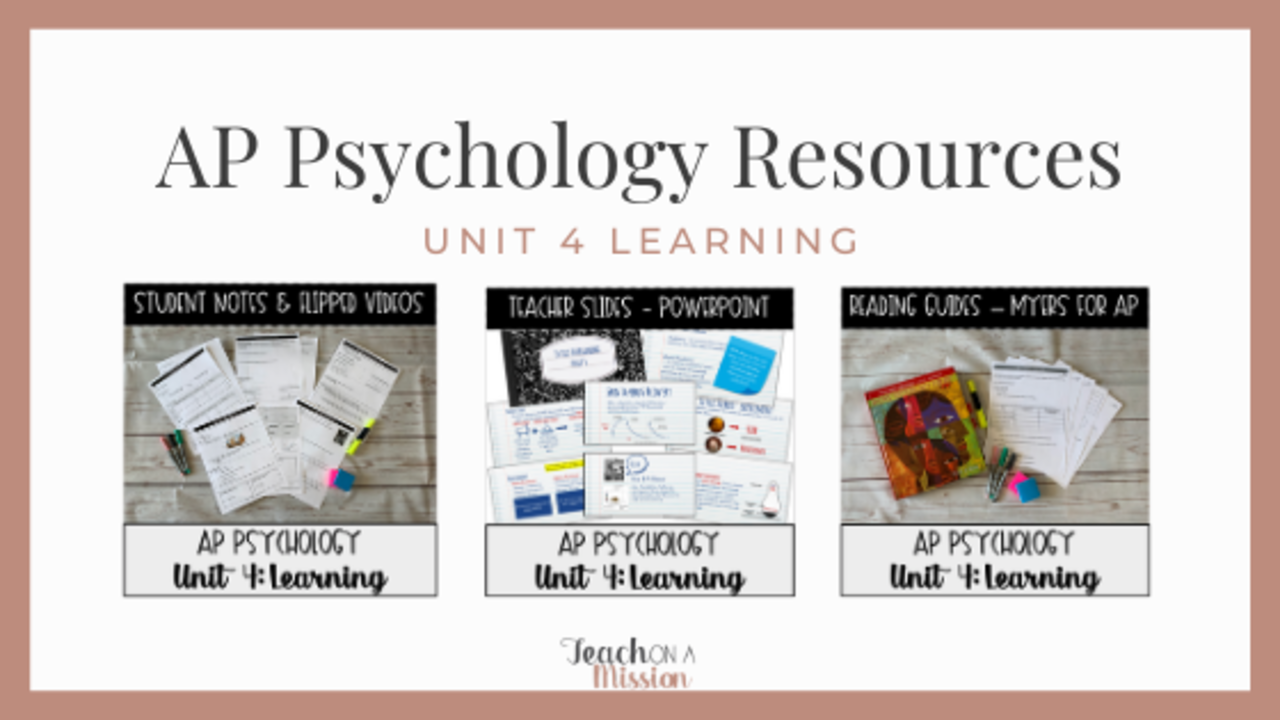
Ok, let's get real. Learning is hard.
Not just that... the statement, "learning is hard" takes on a whole other meaning in psychology, because it's an entire unit!
Not to mention it's not about the stuff you might think of when you say "learning" - stuff like memory and studying... o no, that all goes in the next unit, Cognitive Psychology... stay tuned for that post.
So let's chat about learning and how you might use your time on Learning effectively so students get all the rather confusing terms adjusted in their brains correctly the first time.
Unit 4: Learning
Introducing Classical Conditioning and Operant Conditioning to your students is best done slowly and with examples. I mean visual examples where students can work through the principles of classical conditioning at their own pace. My favorite video to use is this one where a sister conditions her brother- it seems to resonate with students, especially those with younger siblings.
Before you get to examples those, b...

